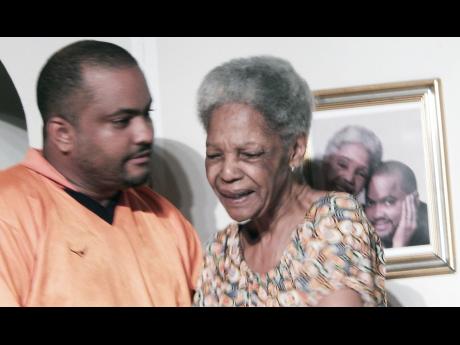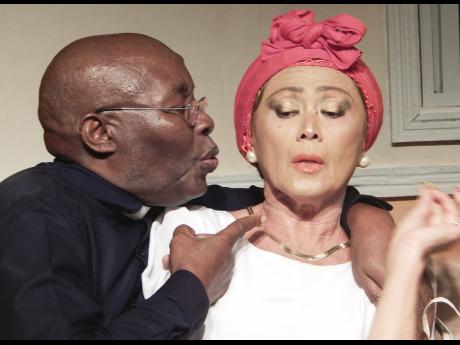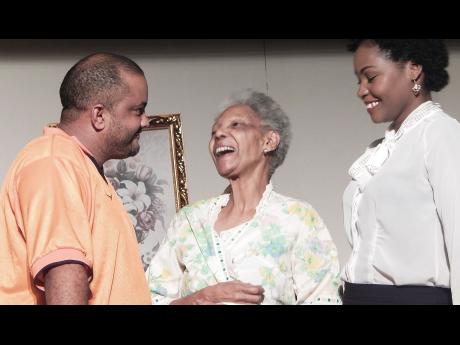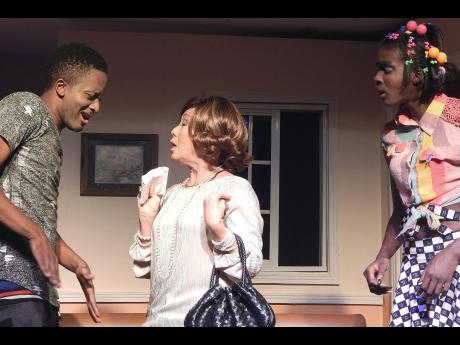For the Reckord | Two weak Tulloch scripts side by side - Theatre manager added to multiple roles
Adding to his numerous theatrical roles of actor, singer, writer, director, producer, composer and designer, David Tulloch recently became a theatre manager.
Last year, he took over management of The Theatre Place on Haining Road from Pablo Hoilett, renamed it The Phoenix Theatre and opened another theatre in the complex. This second theatre, The Blue Room, contains a mere 80 seats and a stage the size of a small bedroom.
When I was there over the weekend, Tulloch explained that The Phoenix Theatre, with its 300 seats, is often too large (and expensive) for some producers. The smaller Blue Room would suit them.
On stage now in that space is Bad Breed, a comedy which Tulloch wrote and directs. It is a presentation of new theatre production house Jamtheatre Productions, which has two principals, Tulloch and Orlando Sinclair.
Sinclair told me he started off in music production but no longer finds it challenging. So last year, he switched to theatre producing, initially with RBT Productions, then with Jamtheatre Productions. He said the new company will produce theatre for "the regular Joe" and is particularly interested in developing new talent.
Currently in The Phoenix Theatre is Across the Bridge, a presentation of Probemaster Productions, Tulloch's own production company. Tulloch wrote, produced and acts in the play.
As the lead actor, he plays Jacob Johnson opposite Leonie Forbes, who plays Martha Johnson, his mother. Jacob's friends are Jamie (Jerry Benzwick), Nicky (Sabrina Thomas) and Rene, played the night I saw the show, by Christene Marshall. She alternates with Crystal Fletcher.
A conventional domestic drama, it is set in a conventional living/dining room area. The actors generally play with consistence and conviction, though I have some problems with the characters. When the play begins, we learn that Jacob, a committed Christian, wants to leave university and enter the clergy. He is also convinced that through the power of the Holy Spirit, he can "lay hands" on his mother and heal her of cancer.
However, Mrs Johnson and Rene have opposing views. The former wants Jacob to finish his degree and get lucrative work; being a pastor doesn't pay well, she says. And Rene wants Jacob to have sex with her - even if it means she'll have to marry him.
This attitude is strange. While Rene seems to need sex, there's no sense of enjoyment in her moments of desire. We hear that her parents are getting a divorce and her sexual hunger may have its origins in that fact, but it is not psychologically explored.
INCIDENT VS CHARACTER
While there are twists and turns in the story which make it intriguing, the problem is that there are too many, and the excess shows the major weakness in the writing. The play is incident-driven, when, as a drama, it should be character-driven.
Incidents pile furiously upon one another in the second act, and they are there because the playwright wants to be entertaining, not because they flow from the characters' dispositions. The play climaxes in a fight which was not properly set up and so is not inevitable. Climaxes should be inevitable - even though, paradoxically, they should also be surprising.
Still, Across the Bridge is a better-written play than Bad Breed, for the former's foundation as a drama is strong and its weaknesses are in the superstructure. The latter is weak fundamentally: it is a drama masquerading as a comedy.
The actors and characters are Maxwell Grant (Pastor Joe), Michael Nicholson (Wilfred), Terri Salmon (Jackie), Ackeem Poyser (Jason) and Daniela Gordon (Teeta). Wilfred has problems with his 17-year-old son, Jason, who has dropped out of school to become a scammer. He also has problems with his girlfriend, Jackie, an upper-class woman who is thinking twice about marrying a semi-literate grade-three dropout.
Not surprisingly, Jackie and Jason dislike each other intensely. There is nothing comic about all these relationships. The problems that exist among them are real and are treated by the playwright as real.
COMICAL CHARACTERS
Pastor Joe and Teeta are the comic characters, but they are characters from two different types of shows. The former is the type found in most comedies produced in Jamaica, real people with idiosyncrasies. Pastor Joe is a lecher, a common enough character.
However, Teeta is a clown, and clowns should be in circuses or clown shows.
She dresses like a clown in clothes of a dozen bright colours, mismatched socks, odd ornaments in her hair. She acts like a clown with exaggerated movements of her limbs and body. And she speaks like a clown. Her words were written to make the audience laugh, not to move the story forward. In fact, she continually interrupts the flow of the action to provide a comic interlude.
Tulloch said he put the character in the play for her crowd appeal. It should have been because Teeta, like the other characters, is integral to the story. A writer's first duty is to the integrity of his play, poem or narrative, not to his audience.
Still, Tulloch might be happy to learn that Teeta was a hit with the five or six children in the audience.








